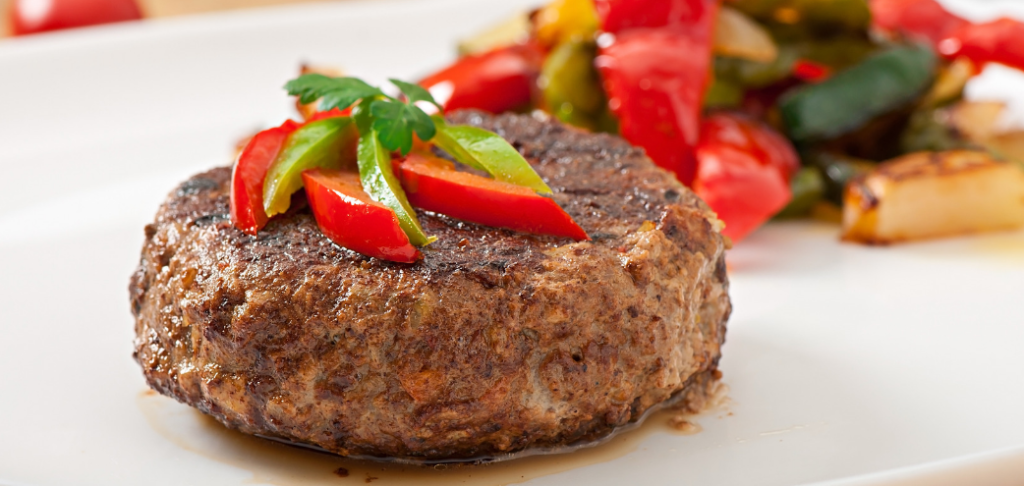
Burgers: Healthy or Not?
- What Makes A Healthy Burger?
- Are Homemade Burgers Healthy?
- Burger Health Benefits
- Protein
- Vitamins and Minerals
- Healthy Fats
- Health Concerns of Burgers
- High Calorie Content
- Saturated Fat
- Food Poisoning
- High Sodium Content
- Increased Risk of Bowel Cancer
- Allergy Considerations
- Buns
- Patties
- Toppings
- Sauces and Condiments
- Different Types of Burger
- Are Beyond Burgers Healthy?
- Are Chicken Burgers Healthy?
- Are Smash Burgers Healthy?
- Optimise Your Diet with YorkTest
Whether sizzling on the BBQ during a hot summer afternoon, picked up as a quick fast-food treat, or handcrafted with love at home, burgers are enjoyed on all kinds of occasions. And it’s no surprise, as burgers are the very definition of a crowd-pleaser. But while they’re undeniably popular, the bigger question remains: are burgers healthy?
On their own, burgers can seem simple enough: meat that’s high in protein, iron, and B vitamins. This has led some to believe they’re a healthier choice than other fast-food staples. However, it’s not quite that straightforward. Burgers aren’t inherently unhealthy; their nutritional value depends largely on the type of meat or patty used, the toppings, and the method of preparation. For instance, traditional fast-food burgers are often high in saturated fat, calories, and additives. In contrast, a burger made with lean meat or a plant-based patty can be a much healthier option.
So, just how healthy are burgers? In this blog, we’ll break down the overall healthiness of burgers, the key considerations to keep in mind, and some practical ways to make them healthier.
What Makes A Healthy Burger?
What makes a burger healthy comes down to how it’s made. A more nutritious burger might use lean ground beef (90-95% lean), ground turkey, or a plant-based option such as portobello mushrooms, quinoa, or black beans. You can also boost the nutritional value of patties by mixing in finely chopped or grated vegetables like onions, carrots, or courgettes (zucchini).
When it comes to buns, a whole-grain or whole-wheat option is generally best (unless you have an allergy or intolerance), as it adds extra fibre. For a lower-calorie alternative, consider using a large lettuce leaf as a wrap, or swap in a lighter bun or even an English muffin.
Toppings can significantly impact the healthiness of your burger. To keep things nutritious, load up on vegetables like tomatoes, onions, pickles, and dark leafy greens such as spinach or kale. Swap high-fat cheese for creamy avocado, and add flavour with mustard, a light vinaigrette, or fermented toppings like kimchi or sauerkraut for a probiotic boost.
Finally, cooking methods matter. Grilling or baking your burger is far healthier than frying, as these methods reduce excess fat and calories while still delivering flavour.
Are Homemade Burgers Healthy?
Homemade burgers give you much more control over their nutritional value. You decide exactly what goes into them, the cooking method used, and how they’re served, unlike mass-produced or fast-food burgers, which are often higher in fat, calories, and additives. Done right, a homemade burger can be a wholesome meal that provides high-quality protein, vitamins, and minerals, without the downsides often found in processed options.
Burger Health Benefits
As previously mentioned, burgers can offer some surprising health benefits. Here’s a breakdown:
Protein
One of the biggest benefits of a burger is its high protein content, which is essential for muscle maintenance and satiety. Protein also supports the production of enzymes and hormones, and it helps you feel full for longer, which can aid weight management by reducing the urge to snack.
Vitamins and Minerals
Burgers are a valuable source of several essential nutrients. They contain iron, which supports haemoglobin production and oxygen transport around the body, as well as zinc, which is important for immune health and numerous bodily functions. Burgers also provide phosphorus (vital for bone growth and cell function), along with B vitamins, which play a key role in metabolism, energy production, and cell development.
Healthy Fats
Not all fats are unhealthy, and burgers can contain beneficial fats that provide the body with energy and support overall health when eaten in moderation.
Health Concerns of Burgers
High Calorie Content
Burgers are often calorie-dense, particularly those made from processed meat or purchased at fast food restaurants. Consuming high-calorie burgers regularly, especially in large portions, can contribute to weight gain and related health issues.
Saturated Fat
Ground beef patties are typically high in saturated fat, which can raise cholesterol levels and increase the risk of heart disease when eaten frequently.
Food Poisoning
Like many foods, burgers carry a risk of foodborne illness if not prepared properly. Raw or undercooked burgers may harbour harmful bacteria such as E. coli, which can lead to serious illness. Because bacteria on the surface of the meat are mixed throughout during mincing, burgers must be cooked thoroughly to a safe internal temperature of at least 70°C.
High Sodium Content
Burgers, especially those that are processed or served in restaurants, often contain high levels of sodium. Excess salt intake can raise blood pressure, which over time increases the risk of heart disease, stroke, and other cardiovascular problems. Choosing lower-sodium options or making burgers at home with fresh ingredients can help reduce this risk.
Increased Risk of Bowel Cancer
Regularly consuming large amounts of red meat, particularly processed or heavily cooked varieties, has been linked to a higher risk of bowel cancer. Moderation is key; balancing your diet with fibre-rich foods, fruits, and vegetables can help lower this risk.
Allergy Considerations
When it comes to allergies, burgers themselves carry a relatively low risk of common allergens. However, there are still potential risks to be aware of.
Buns
For many, a burger wouldn’t be a burger without a split burger bun. However, traditional buns contain wheat, which can be an issue for those with coeliac disease or a wheat allergy. If you suffer from a wheat allergy, you can still opt for gluten-free buns or even lettuce wraps as an alternative.
Patties
Beef patties are generally less likely to contain common allergens, but there is still potential risk. For example, binders may include wheat or egg, while some plant-based or vegan patties can contain allergens such as soy, wheat, nuts, and egg.
Toppings
Nothing completes your burger quite like a good topping, but some toppings can contain allergens to watch out for. Cheese is amongst the popular burger toppings, but it is a dairy product and contains milk, a major allergen. Some prefer avocado as an alternative to cheese, but these still need to be checked for allergies such as tree nuts.
Sauces and Condiments
Sauces and condiments are another great way to top off your burger. However, some popular sauces, such as mayonnaise, contain egg, which is a common allergen.
Different Types of Burger
Are Beyond Burgers Healthy?
Beyond Burgers can be a healthier alternative to beef, offering plant-based protein, iron, and vitamin B12 without cholesterol, hormones, or antibiotics. However, they are still highly processed and can contain notable amounts of sodium and saturated fat, so they’re best enjoyed in moderation as part of a balanced diet.
Are Chicken Burgers Healthy?
Chicken burgers can be a healthier choice than beef as they’re usually lower in calories and saturated fat, especially when made with lean ground chicken and grilled or pan-seared. Adding vegetables and serving on a whole-grain bun can boost their nutritional value. However, processed patties, deep-frying, high-fat toppings, and oversized fast-food portions can quickly make them less healthy due to added sodium, preservatives, and excess calories.
Are Smash Burgers Healthy?
Smash burgers can fit into a healthy diet if prepared with care, but their nutrition largely depends on the meat, bun, toppings, and sides. Choosing lean beef, fresh vegetables, and whole-grain or low-carb buns makes them lighter, while keeping sauces and cheese minimal helps cut calories and saturated fat. Portion control and healthier sides (like salads instead of fries) also play a big role in keeping smash burgers a balanced option.
Optimise Your Diet with YorkTest
Balancing your diet with everyday life isn’t always easy, but YorkTest can help. As the UK’s leading provider of at-home allergy and intolerance tests, we make it simple to understand how food affects your body. With expert guidance and a wide range of tests, we’ll give you the clarity you need to make healthier choices and feel your best. Whether you want to know if you have a food intolerance or want to get your stress levels in check, we can help optimise your diet.









